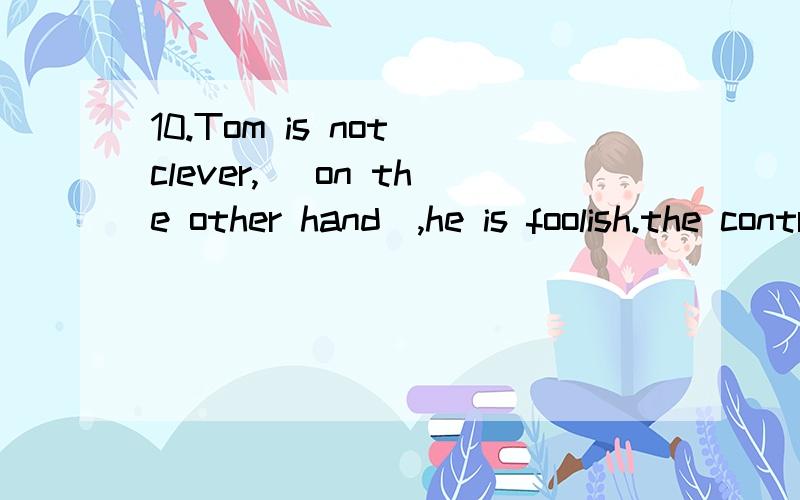10.Tom is not clever,( on the other hand),he is foolish.the contrary,可前后不是说的一10.Tom is not clever,( on the other hand),he is foolish.the contrary,可前后不是说的一个意思吗?嗯……用 in other words行吗?会不会
来源:学生作业帮助网 编辑:作业帮 时间:2024/11/05 02:16:44

10.Tom is not clever,( on the other hand),he is foolish.the contrary,可前后不是说的一10.Tom is not clever,( on the other hand),he is foolish.the contrary,可前后不是说的一个意思吗?嗯……用 in other words行吗?会不会
10.Tom is not clever,( on the other hand),he is foolish.the contrary,可前后不是说的一
10.Tom is not clever,( on the other hand),he is foolish.
the contrary,可前后不是说的一个意思吗?嗯……用 in other words行吗?
会不会是这样:on the contrary否定的是clever 而不是否定not clever?
10.Tom is not clever,( on the other hand),he is foolish.the contrary,可前后不是说的一10.Tom is not clever,( on the other hand),he is foolish.the contrary,可前后不是说的一个意思吗?嗯……用 in other words行吗?会不会
这个用法也曾经困扰过我 on the contrary否定的是Tom is clever这个说法.这里有点难理解,其实都是说话的习惯,所以也没什么语法可循.
老师给我一个方法 就是把他们译成中文来理解
Tom is not clever,
Tom从来都不聪明
on the contrary
相反
he is foolish
他是一个大笨蛋
这样好理解了吗?
在例句里 in another words 反而是不能用的
in another words是“即”,“也就是”的意思,一般用在两个有逻辑关系句子,短语或定义中间.
像这个句子,前后两部分没有明显的逻辑关系,而都只是在陈述同样的事实,所以用in another words 不妥.
要是实在不好理解的话,我们还是可以把它译成中文来理解.
Tom从来都不聪明,也就是说他是一个大笨蛋.
这个句子冗长多余,显然不是一个连贯句.
咳咳,说这么多,您理解了么?